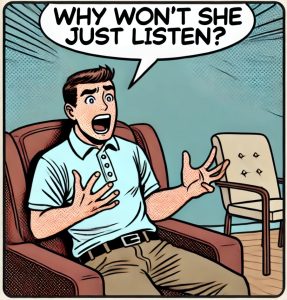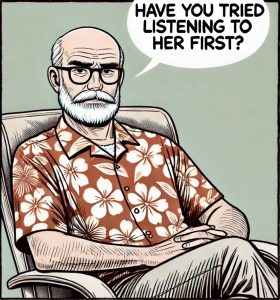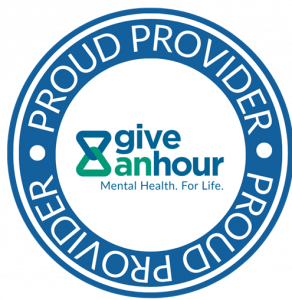This Post Is for People Who Struggle to Set and Keep Boundaries
This post isn’t about how to set boundaries. I’ve already written that.
But my friend William—thoughtful, kind, and a former therapist himself—explained to me after reading that piece to say, gently, that something was missing. Not wrong. Incomplete.
Specifically: what has to happen inside before boundaries work on the outside.
A Thoughtful Challenge From a Friend
William has lived a lot of life. He’s not interested in winning arguments—he notices patterns, reflects on them, and then says something that makes you pause.
That’s what he did here.
He pointed out that boundaries haven’t always occupied the central place they do now in psychotherapy. Early therapy focused more on intrapsychic boundaries—ego, superego, conscious and unconscious. The interpersonal boundary boom really took off later, especially in the 1980s and 90s, alongside 12-step work and increased attention to addiction, abuse, and trauma.
Fair point.
But then he named something more important.
The Shadow Side of Boundary Setting
William described watching people set boundaries with pressured speech, fear in their eyes, sometimes even rage—like they were bracing for a fight. Less self-respect, more defensive maneuver. He wondered whether some boundary setting was really about control, or about a frightened part of ourselves trying desperately not to get hurt again.
I didn’t disagree.
I’ve seen people avoid boundaries because they’re afraid of the reaction they’ll get. Afraid someone will get angry. Afraid the relationship will change. Afraid something long-standing might fall apart. These are often relationships with history—family, partners, people who’ve been around for decades.
That fear keeps people from doing what needs to be done. By keeping the smaller peace, they set the stage for a biggerwar—one that tends to break out later, louder, and uglier.
I can’t tell you how often I’ve said this in my office: Good fences make good neighbors. Good boundaries make good relationships.
And if a relationship can’t survive a boundary around something you truly can’t live with? That’s not a failure. Painful, yes—but also clarifying. Why are you working so hard to preserve a relationship that only functions if you keep abandoning yourself?
As God told Abraham in Genesis 12:1: Get thee out.
Why Late Boundaries Turn Into Rage
When William mentioned rage, it might have sounded like an exaggeration. It isn’t.
If you don’t set boundaries, people will take advantage of you. Call it fair or unfair—it doesn’t matter. Humans do what humans do, usually without much awareness of why they’re doing it.
As toes get stepped on again and again, resentment builds. When resentment builds long enough, it hardens into anger. And when anger goes unaddressed, it turns into rage.
At that point, boundaries finally get set—but they’re explosive, damaging, and hard to sustain. They’re powered by emotion rather than conviction. Once the emotional surge fades, the boundary collapses.
The way to avoid rage-boundaries is simple, though not easy: set boundaries earlier.
The Boundary Is With Yourself First
This is where William shared a story that really landed.
Years ago, he called his friend David to talk through a boundary he was planning to set. David listened and then said,
“It sounds like the person you really need to be setting boundaries with is yourself.”
That’s the heart of it.
Before you say anything to someone else, you have to get clear within yourself:
- What can go
- What cannot go
- What you are—and are not—willing to live with
When that clarity is real, it changes your presence. And that presence changes how conversations go. It even changes which conversations you decide to have at all.
William was reminded of something Louise Hay once said—paraphrased, but true to her spirit: if you don’t like what someone is doing, don’t try to change them.
Say “no thank you,” and move toward the kind of relationship and environment you want to participate in.
No drama. No punishment. Just living in line with what you’ve already decided.
Why Boundaries Fail: It’s Not the Words
The number-one reason boundaries fail is simple: they’re never actually set. They’re wished for rather than made. A close second is that they’re framed as requests instead of limits.
But even when people do everything “right,” many still assume boundaries fail because they didn’t say them properly. Wrong words. Wrong tone. Too soft. Too harsh. If only they’d rehearsed better.
In my experience, boundaries don’t fail because of wording. They fail because the person setting them doesn’t yet believe them.
You can’t hold a boundary you don’t mean.
I learned this years ago as a new parent. Our young child loved climbing into our bed at night. We said “no” and put him back—again and again. Minutes later, a warm, loving, beautiful child was right back where he wanted to be.
It wasn’t until my therapist told me—rather memorably—that boundaries are like curses in Harry Potter lore: you have to mean them.
Once the boundary was internally settled—this is no longer happening—things changed. Same words. Different intention.
Healthy Boundaries Start With Internal Conviction
The earlier post was about boundary mechanics. This one is about why boundary work keeps therapists like me fully employed.
If boundary setting feels anxious, brittle, or explosive, that’s not a sign you’re failing. It’s a sign more internal work is needed—the work of deciding, quietly and firmly, what you’re no longer available for.
Once that decision is made, boundaries tend to come out cleaner. Calmer. Less like a threat and more like a fact.
William didn’t convince me boundaries are outdated. But he did remind me—and I think he’s right—that boundaries work best when they aren’t weapons, ultimatums, or last-ditch attempts to control outcomes.
They work when they reflect something already decided inside.
And those are the boundaries that last.


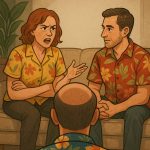
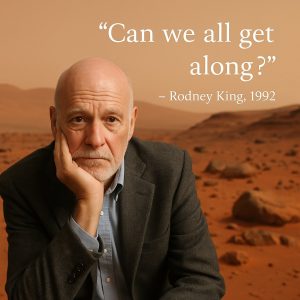 Conflict Isn’t Just Personal—It’s Primal
Conflict Isn’t Just Personal—It’s Primal
